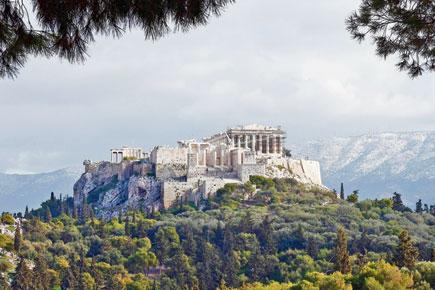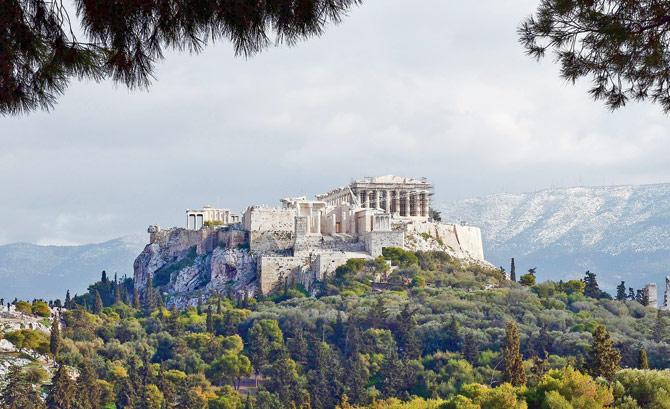In Athens, where you would imagine there to be a state of utter gloom, there is, instead, a passionate continuation of life


Right now I am sitting on the terrace of my hotel in Athens, unmoored at the sight of the Acropolis. Pic/Getty Images
ADVERTISEMENT

Right now I am sitting on the terrace of my hotel in Athens. It has been an hour since I took the elevator and took my seat at my table, but I am still unmoored at the sight of the Acropolis that is so easily within view I feel like I could engineer a well-made paper airplane and it would land at the mythical foot of the site where Lysistrata and her Athenian counterparts, all women, chose to protest against the ongoing war with Sparta by denying their men sex, food and emotional nourishment. She was always my favourite Greek character, Lysistrata. I have always admired her ability to intuit that under the right circumstances, with clever manoeuvring and manipulation, men could be compelled to choose peace over war. Lysistrata knew that above all else, above even the need for conquest, it is the human desire for intimacy that reigns supreme. "Imagine a city where there is no desire," the Greek Lesbian poet Sappho wrote in one of her fragments. "A city without desire is, in sum, a city with no imagination. Here people think what they already know. Fiction is simply falsification… This city has an akinetic soul, a condition that Aristotle might explain in the following way. Whenever any creature is moved to reach out for what it desires, Aristotle says, that movement begins in an act of the imagination, which he calls phantasia." I re-read this excerpt from the end of 'Eros the Bittersweet', Anne Carson's series of essays on Sappho's poetry, last evening, as I was listening to Dafne Vicente Sandoval, a bassoon player perform a composition by Jakob Ullman. It was a slow, meditative piece that lilted between just a few notes rendering the bassoon so pliable and harmonious. We were seated in a room in the Athens Conservatory, close to Aristotle's Lyceum, having been led there by the Greek ethnomusicologist, Athina Katsanevaki, who sang three Byzantine songs. We were supposed to be still, but I couldn't suppress the impulse to return to Sappho, as if I needed to summon her to the gathering.
I am here to 'learn from Athens', to obey the premise of Documenta 14, a quinquennial that has, since 1955, always taken place in its home place of Kassel. This year, the artistic director decided to host it as a twin-fold exhibition of contemporary art in two sites, Athens and Kassel (Germany), to encourage a dialogue between the two host countries whose recent relationship with each other has been tenuous. There is no escaping the state of crisis that holds Athenian inhabitants captive. There is anger and frustration. My hotel, located in the heart of Exarchea, the city's anarchist hub, affords me some sense of the complex ideologies that have come to define this particular district.
But I am safe, I am told, despite a supermarket nearby being robbed at gunpoint the evening I arrived. They're not after individuals, they after institutions, I am told, which means I will not be the subject of any attack. Strangely, I do not feel unsafe. And where you would imagine there to be a state of utter gloom, there is, instead, a passionate continuation of life. My first night at the hotel, for example, was a noisy one, because the taverna opposite my room was flooded with young people drinking, conversing, smoking up. I read their activity as a manifestation of a still-desiring city, one that remains optimistic, for optimism is wedded to desire, unlike cynicism. So my first lesson from Athens is this half-baked thought, that as long as we, as a civilization, continue to practise desire, we will not be outdone by our proclivity towards self-destruction. Because our phantasia, which, as Carson summarises, "stirs the mind to movement by the power of its representing the desired object as desirable to the mind of the desirer." Sappho says: "Sokrates calls Eros a Sophist but Sappho calls him weaver of fictions." As long as we still tell stories, sing songs, make art, and thus trade in metaphors, we should outlive the apocalypse.
Deliberating on the life and times of Everywoman, Rosalyn D'Mello is a reputable art critic and the author of A Handbook For My Lover. She tweets @RosaParx Send your feedback to mailbag@mid-day.com
 Subscribe today by clicking the link and stay updated with the latest news!" Click here!
Subscribe today by clicking the link and stay updated with the latest news!" Click here!






